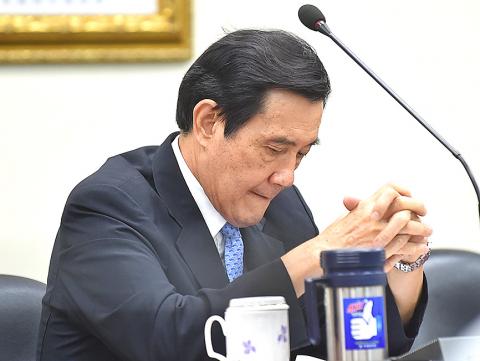Former president Ma Ying-jeou (馬英九) yesterday said that the Taipei District Prosecutors’ Office was “following orders” when it decided to indict him and reassured the Chinese Nationalist Party’s (KMT) Central Standing Committee that he did not undersell the party’s assets when he was party chairman.
Ma was invited by KMT Chairman Wu Den-yih (吳敦義) to address the committee regarding his sales of Central Motion Picture Corp, Broadcasting Corp of China and China Television Co (CTV).
Although the KMT on Saturday last week said in a news release that the invitation was extended as a demonstration of the party’s belief in Ma’s integrity, Wu yesterday said that the party was “not trying to fight a certain government agency, nor endorsing a specific individual.”

Photo: Liu Hsin-de, Taipei Times
“We are simply hoping to examine the appropriateness of Ma’s handling of the companies’ sales through a fair and objective lens,” Wu said, adding that Ma, as a former KMT chairman, deserved a chance to explain his side of the story.
Ma on Tuesday last week was charged with breach of trust and contraventions of the Securities and Exchange Act (證券交易法) for his role in the KMT’s sales of several party assets in 2005 and 2006, including the three companies.
The two people who managed the KMT’s finances used an elaborate financial scheme, which Ma approved, that enabled the party to sell the media companies and other assets at below-market prices, which caused the KMT to lose NT$7.29 billion (US$238.38 million at the current exchange rate), the indictment said.
“I take full responsibility for what I say and I can assure each and every committee member that I did not undersell KMT assets when I was the party chairman,” Ma said. “Every decision was made based on my judgement of what was best for the party.”
Ma said the sales had already been scrutinized by the now-defunct Special Investigation Division, which cleared the case of any wrongdoings after an eight-year probe that questioned nearly 100 people.
That the case was reopened after the Democratic Progressive Party administration took office in 2016 and that he has been indicted reeks of political intervention, Ma said.
“I believe people’s eyes are sharp and they can know whether the prosecutors’ office was following orders when it decided to indict me,” he said.
Citing as an example the sale of KMT-run Hua Hsia Investment Holding Co’s shares in CTV to Jungli Investment Co, a subsidiary of what is now known as the Want Want China Times Group, Ma said that Jungli paid NT$892.5 million for the shares, which had a book value of about NT$700 million at the time.
“How could you call it underselling when the party sold the shares of a media company that had been in the red for years at a price that was higher than its book value?” Ma asked.

Japanese footwear brand Onitsuka Tiger today issued a public apology and said it has suspended an employee amid allegations that the staff member discriminated against a Vietnamese customer at its Taipei 101 store. Posting on the social media platform Threads yesterday, a user said that an employee at the store said that “those shoes are very expensive” when her friend, who is a migrant worker from Vietnam, asked for assistance. The employee then ignored her until she asked again, to which she replied: "We don't have a size 37." The post had amassed nearly 26,000 likes and 916 comments as of this

US President Donald Trump said "it’s up to" Chinese President Xi Jinping (習近平) what China does on Taiwan, but that he would be "very unhappy" with a change in the "status quo," the New York Times said in an interview published yesterday. Xi "considers it to be a part of China, and that’s up to him what he’s going to be doing," Trump told the newspaper on Wednesday. "But I’ve expressed to him that I would be very unhappy if he did that, and I don’t think he’ll do that," he added. "I hope he doesn’t do that." Trump made the comments in

Tourism in Kenting fell to a historic low for the second consecutive year last year, impacting hotels and other local businesses that rely on a steady stream of domestic tourists, the latest data showed. A total of 2.139 million tourists visited Kenting last year, down slightly from 2.14 million in 2024, the data showed. The number of tourists who visited the national park on the Hengchun Peninsula peaked in 2015 at 8.37 million people. That number has been below 2.2 million for two years, although there was a spike in October last year due to multiple long weekends. The occupancy rate for hotels

A cold surge advisory was today issued for 18 cities and counties across Taiwan, with temperatures of below 10°C forecast during the day and into tonight, the Central Weather Administration (CWA) said. New Taipei City, Taipei, Taoyuan and Hsinchu, Miaoli and Yilan counties are expected to experience sustained temperatures of 10°C or lower, the CWA said. Temperatures are likely to temporarily drop below 10°C in most other areas, except Taitung, Pingtung, Penghu and Lienchiang (Matsu) counties, CWA data showed. The cold weather is being caused by a strong continental cold air mass, combined with radiative cooling, a process in which heat escapes from